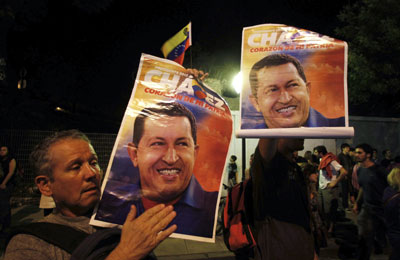
Venezuela's Hugo Chavez dies from cancer
Caracas, March 6, 2013
Venezuela's President Hugo Chavez died on Tuesday after a two-year battle with cancer, ending 14 years of tumultuous and divisive rule that won him passionate support among the poor but hatred from business leaders and wealthy Venezuelans.
The flamboyant 58-year-old had undergone four operations in Cuba for a cancer that was first detected in his pelvic region in mid-2011. He vanished from public view after Dec. 11 surgery that resulted in complications and respiratory infections.
"It's a moment of deep pain," said Vice President Nicolas Maduro, choking up during a national address. "Commander, thank you so much, on behalf of these people whom you protected."
Military chiefs quickly pledged loyalty to Maduro, who will be caretaker leader until elections are called within 30 days. Weeping Chavez supporters poured onto the streets, chanting "Chavez lives! The revolution continues!" and "We are Chavez!"
"Don't let anyone try to convince you Chavez has gone ... He will always be with us," said Congress head Diosdado Cabello.
The president's death was announced by Maduro, flanked by cabinet ministers, less than an hour after he passed away.
State TV broadcast Chavez's emotional last speech from December, shops in Caracas locked up for fear of looting, and condolences came from around the world, including messages from filmmaker Oliver Stone and UN Secretary General Ban Ki-moon.
Tensions ran high in some areas. Colombia's RCN TV showed one of its reporters bleeding from a head wound after she was apparently beaten by Chavez supporters outside the military hospital.
Chavez easily won a new six-year term at an election in October and his death is devastating for millions of supporters who adored his charismatic style, anti-U.S. rhetoric and oil-financed policies that brought subsidized food and free health clinics to long-neglected slums.
Detractors, however, saw his one-man style, gleeful nationalizations and often harsh treatment of opponents as traits of an egotistical dictator whose misplaced statist economics wasted a historic bonanza of oil revenues.
Chavez's corpse will lie in state at a Caracas military academy until a formal funeral ceremony on Friday, and seven days of mourning will be observed, officials said.
"The funeral of Chavez is going to rival Eva Peron's in Argentina," said Daniel Hellinger, a Venezuela expert in the United States, referring to the beloved former first lady of Argentina who died at the height of her popularity in 1952.
MADURO FAVOURITE TO WIN ELECTION
Chavez's death opens the way for a new election that will test whether his socialist "revolution" can live on without his dominant personality at the helm.
The new vote will likely pit Maduro against Henrique Capriles, the centrist opposition leader and state governor who lost to Chavez in October. Maduro appealed for calm and respect for democracy.
One recent opinion poll gave Maduro a strong lead because he is Chavez's preferred successor, enjoys support among many of the working class and could benefit from an inevitable surge of emotion in the coming days.
Maduro has been a close ally of Chavez for years and would be very unlikely to make significant changes to the late president's socialist policies, although he could at some point try to ease tensions with investors and the U.S. government.
Just hours before Chavez's death, though, Maduro alleged that "imperialist" conspirators had infected the president with cancer among a plethora of conspiracies with domestic opponents. The government never said what type of cancer Chavez had, but experts suspect it was a soft-tissue sarcoma.
US President Barack Obama said his government was interested in starting a new relationship with Venezuela.
"At this challenging time ... the United States reaffirms its support for the Venezuelan people and its interest in developing a constructive relationship with the Venezuelan government," Obama said in a statement.
Chavez was a garrulous figurehead for a global "anti-imperialist" alliance stretching as far as Belarus and Iran, and will be sorely missed by anti-US agitators.
After the cancer was diagnosed in June 2011, Chavez went through several cycles of disappearing from the public eye for weeks at a time for treatment in Havana, only to return just as his adversaries were predicting his demise.
His health weakened severely just after his re-election on Oct. 7, possibly due to his decision to campaign for a third term instead of stepping aside to focus on his recovery. - Reuters







